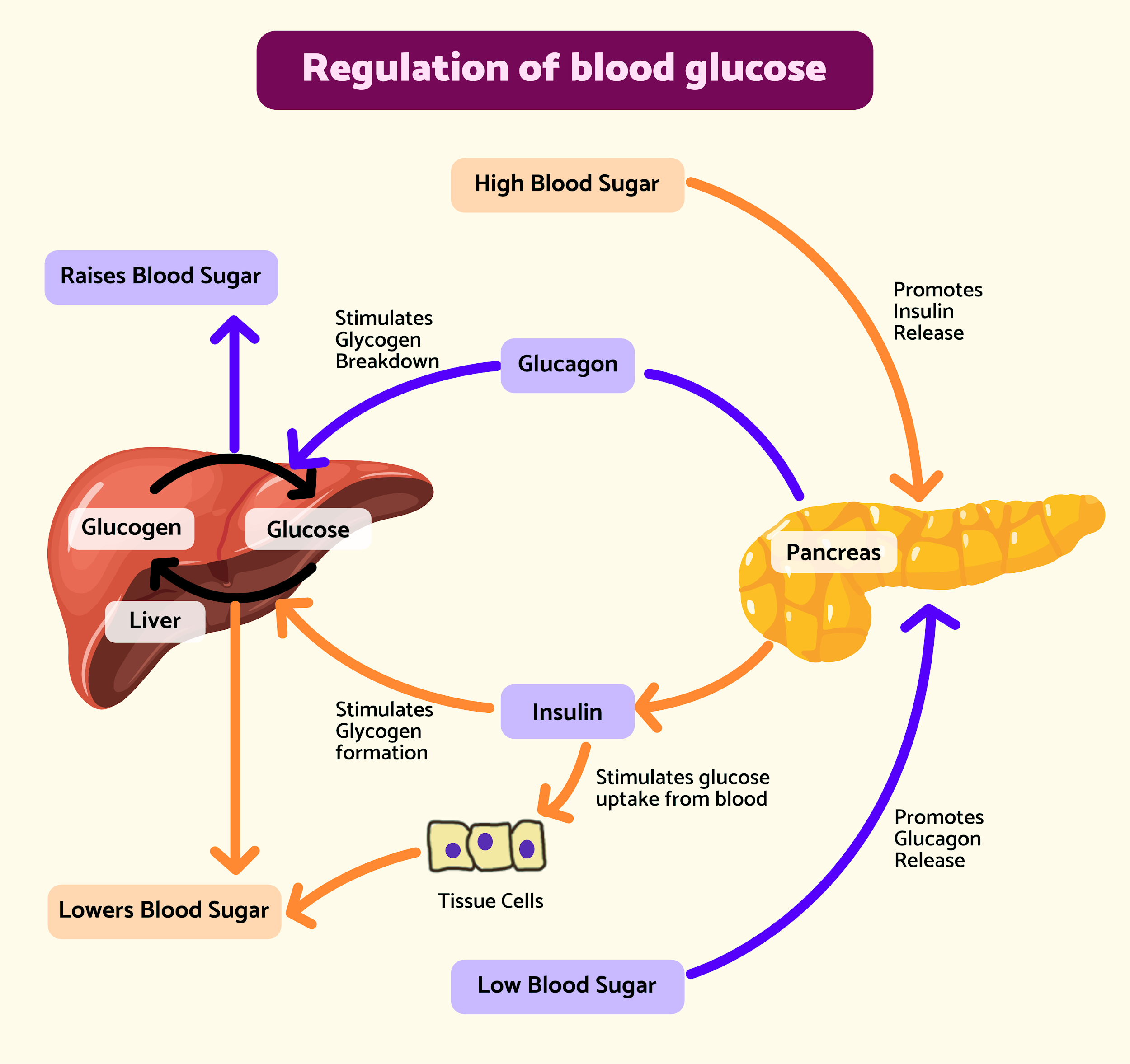
Which hormone lowers the blood sugar in humans? Name the gland which secretes this hormone.
Answer
565.5k+ views
Hint: The hormone which lowers the blood sugar in humans is a peptide hormone and is considered to be the main anabolic hormone of the body. It is secreted by the organ which is located in the abdomen behind the stomach and functions as a gland.
Complete solution: Insulin is the hormone which lowers the blood glucose level in humans. This hormone causes the liver to convert more glucose into glycogen (this process is named glycogenesis). Although there's always a low level of insulin secreted by the pancreas, the quantity secreted into the blood increases as the blood sugar rises. Similarly, as blood glucose falls, the quantity of insulin secreted by the pancreatic islets goes down.
It is produced in the pancreas and is synthesized in the pancreas within the beta cells of the islets of Langerhans.
Additional Information: Inflammation of the pancreas is commonly known as pancreatitis, with common causes including chronic alcohol use and gallstones. Due to its role within the regulation of blood glucose, the pancreas is additionally a key organ in diabetes mellitus. Decreased or loss of insulin activity leads to diabetes mellitus, a condition of high blood glucose level (hyperglycemia). There are two kinds of diseases. In type 1 diabetes, the beta cells are destroyed by an autoimmune reaction so that insulin can not be synthesized or be secreted into the blood. In type 2 diabetes, the destruction of beta cells is a smaller amount pronounced than in type 1 diabetes and isn't because of an autoimmune process. Instead, there's an accumulation of amyloid within the pancreatic islets, which likely disrupts their anatomy and physiology.

Note: The neighboring cells of the beta cells i.e alpha cells, secrete glucagon into the blood in the opposite manner i.e increased secretion when blood sugar is low, and decreased secretion when glucose concentrations are high. Glucagon increases blood sugar levels by stimulating glycogenolysis and gluconeogenesis within the liver.
Complete solution: Insulin is the hormone which lowers the blood glucose level in humans. This hormone causes the liver to convert more glucose into glycogen (this process is named glycogenesis). Although there's always a low level of insulin secreted by the pancreas, the quantity secreted into the blood increases as the blood sugar rises. Similarly, as blood glucose falls, the quantity of insulin secreted by the pancreatic islets goes down.
It is produced in the pancreas and is synthesized in the pancreas within the beta cells of the islets of Langerhans.
Additional Information: Inflammation of the pancreas is commonly known as pancreatitis, with common causes including chronic alcohol use and gallstones. Due to its role within the regulation of blood glucose, the pancreas is additionally a key organ in diabetes mellitus. Decreased or loss of insulin activity leads to diabetes mellitus, a condition of high blood glucose level (hyperglycemia). There are two kinds of diseases. In type 1 diabetes, the beta cells are destroyed by an autoimmune reaction so that insulin can not be synthesized or be secreted into the blood. In type 2 diabetes, the destruction of beta cells is a smaller amount pronounced than in type 1 diabetes and isn't because of an autoimmune process. Instead, there's an accumulation of amyloid within the pancreatic islets, which likely disrupts their anatomy and physiology.

Note: The neighboring cells of the beta cells i.e alpha cells, secrete glucagon into the blood in the opposite manner i.e increased secretion when blood sugar is low, and decreased secretion when glucose concentrations are high. Glucagon increases blood sugar levels by stimulating glycogenolysis and gluconeogenesis within the liver.
Recently Updated Pages
Master Class 11 Computer Science: Engaging Questions & Answers for Success

Master Class 11 Business Studies: Engaging Questions & Answers for Success

Master Class 11 Economics: Engaging Questions & Answers for Success

Master Class 11 English: Engaging Questions & Answers for Success

Master Class 11 Maths: Engaging Questions & Answers for Success

Master Class 11 Biology: Engaging Questions & Answers for Success

Trending doubts
One Metric ton is equal to kg A 10000 B 1000 C 100 class 11 physics CBSE

There are 720 permutations of the digits 1 2 3 4 5 class 11 maths CBSE

Discuss the various forms of bacteria class 11 biology CBSE

Draw a diagram of a plant cell and label at least eight class 11 biology CBSE

State the laws of reflection of light

10 examples of friction in our daily life




